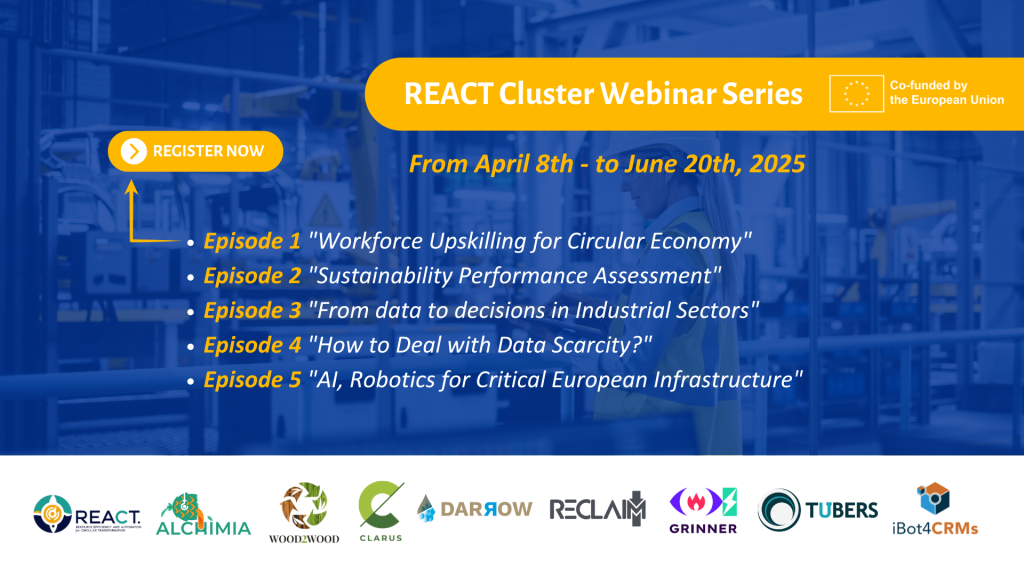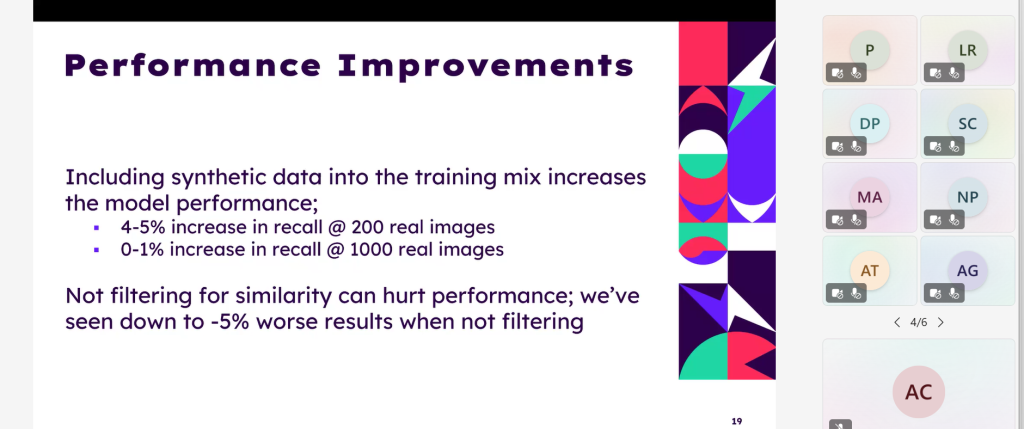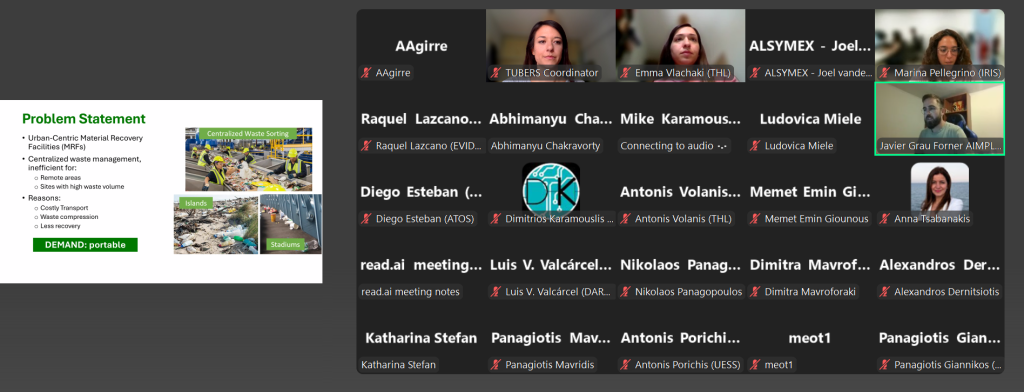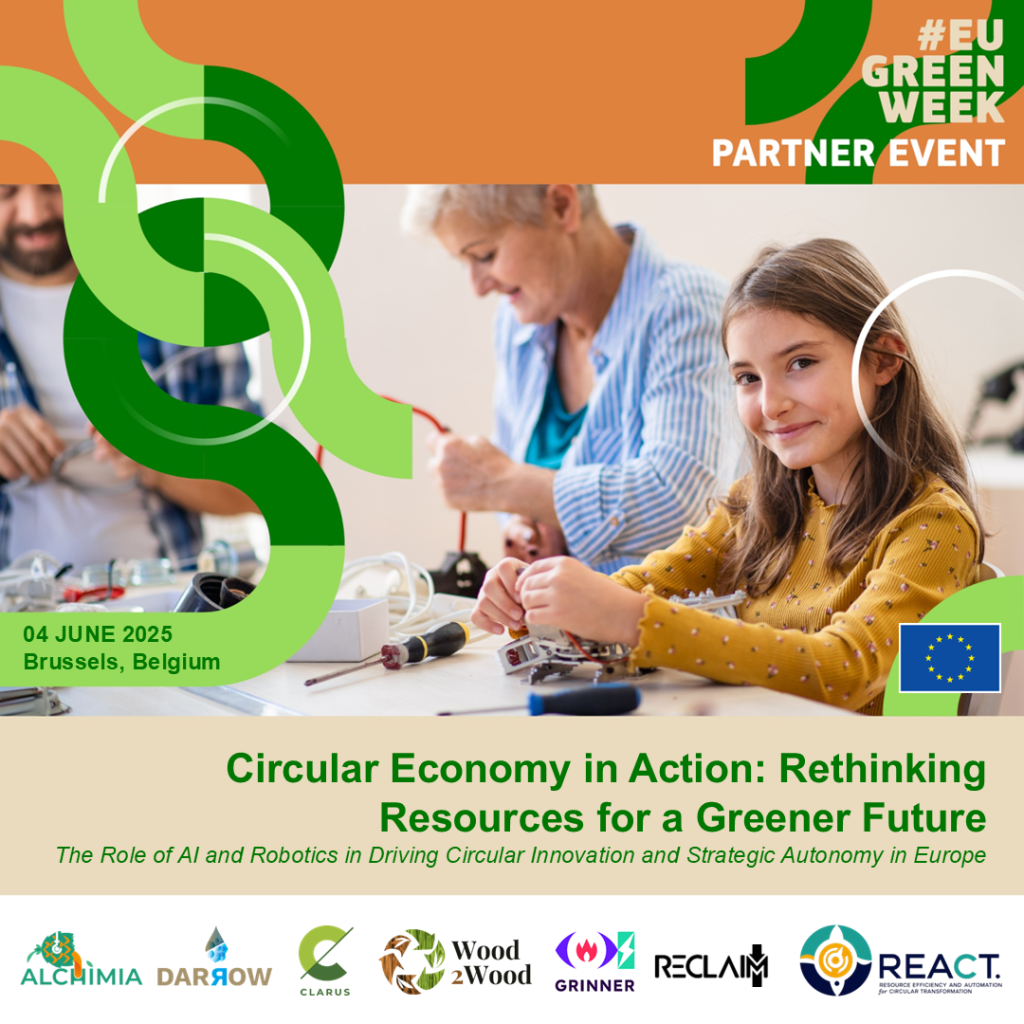
Europe stands at the intersection of multiple challenges. From climate change and environmental degradation to reducing material dependence on foreign countries and increasing industrial competitiveness in the face of fierce global competition, Europe has a lot to achieve to become climate-neutral by 2050.
But what does the path towards a climate-neutral goal look like?
The EU Clean Industrial Deal provides clear and practical guidance to achieve this goal. At the core of the Clean Industrial Deal is the urgent need to balance sustainability ambitions with competitiveness for a truly clean, circular and competitive European Union. AI, Data and Robotics play a crucial role in this regard to accelerate this green transition. However, several elements need to work together to enable this green and circular transition.
Achieving a green transition that is both competitive and innovative requires a holistic approach grounded in data, technology, and people. Key elements such as sustainability performance assessment, workforce upskilling, and talent retention ensure that industries are equipped to meet environmental goals while maintaining productivity. Leveraging AI and big data enables smarter decision-making, especially in resource recovery and waste management, while addressing data scarcity is essential to unlock the full potential of digital tools. Together, these components enhance the efficiency and resilience of Europe’s critical infrastructure and industry, driving a transition that is not only green but also future-ready.
This was the focus of the Cluster webinar series initiated by 8 EU-funded projects, called the REACT Cluster which stands for “Resource Efficiency and Automation for Circular Transformation”. The REACT Cluster consists of ALCHIMIA Project, CLARUS Project, DARROW Project, RECLAIM Project, GRINNER Project, iBot4CRMs, Wood2Wood Project, and Tubers project.
These cross-sectoral projects aim to unlock new value in circular economy strategies, from AI-powered municipal waste sorting (RECLAIM), critical raw materials separation (iBot4CRMs), scrap steel analysis (ALCHIMIA), to smarter wastewater treatment (DARROW), robotic WEEE sorting (GRINNER), sustainability performance measurement (CLARUS), wood waste cascade valorisation upcycling approaches (Wood2Wood), and reduce drinking water losses through pipeline inspection (Tubers project).
Together, these EU-funded projects will share their cross-sectoral knowledge on the practical application of digital and AI-driven solutions to enhance sustainability, reduce waste and drive strategic autonomy in industrial sectors. In this way, these projects offer clear and practical steps for integrating ADR (AI, Data and Robotics) into the core of the European Green Deal.
First Webinar was organized by ALCHIMIA on Workforce Upskilling & Talent Retention in the industrial sector on April 8th.
The central question was: How is digitalization shaping industry jobs & skills? What skills are required for industrial jobs of tomorrow?
As industries undergo rapid digital transformation, the demand for skilled workers continues to evolve.
- How can companies attract and retain young talent in technical fields?
- What role do automation and digitalization play in shaping the workforce?
- What skills will be essential for the future of the industrial sector?
Second Webinar was organised by CLARUS project on Sustainability Performance Assessment on April 29th.
This webinar explored current approaches, tools, and methodologies for assessing sustainability performance in European Union Horizon projects. Speakers from leading institutions will share insights from ongoing initiatives in CLARUS, RECLAIM, ALCHIMIA and GRINNER, providing practical perspectives on environmental KPIs, circularity metrics, and digital tools for monitoring sustainability across manufacturing processes.
Third webinar was organised by RECLAIM Project on Data-Driven Decision Making in Industrial Sectors that took place on 20th May.
The webinar explored how data and AI are transforming decision-making across key industrial sectors. It showcased innovative approaches from leading projects—RECLAIM, ALCHIMIA, iBot4CRMs and DARROW—highlighting how big data, imaging, and AI technologies are being leveraged to boost efficiency and sustainability in waste and resource recovery. From smarter recycling of solid waste through AI-powered sorting, to using scrap steel data for circular economy insights, to CRMs recovery and recycling through AI-driven robotics, and optimizing wastewater recovery with intelligent data use — the projects shared knowledge on how data-driven tools are reshaping the future of industrial decision-making.
Key takeaways
Data quality is the foundation for AI success
- (Michalis) emphasised that the efficacy of AI and Data systems rests on the quality of the input waste stream. For RECLAIM, industries must ensure consistent and standardised waste types (e.g., Plastic, Metal and Drinking Cartons (PMD) for a solution like prMRF to be effective.
- Poor-quality or inconsistent inputs undermine optimisation and recovery performance.
Integration of AI, Robotics, and vision systems must be seamless and profitable
- Antonio from iBot4CRMs) pointed out that for AI-driven solutions to scale, they must integrate robotics, computer vision, and AI models effectively.
- Adoption depends heavily on economic viability — if Critical Raw Materials (CRMs) recovery processes are not profitable, waste management plants won’t adopt them.
Sustainable models beyond research projects
- Petri From Alchimia said to ensure long-term impact, AI optimization software must transition from research projects to operational use through either a sustainable service model or operator-led adoption.
AI will not replace plant operators — It will empower them
- (Cesar) stressed the importance of gaining operator trust. AI tools are meant to support human decision-making, enhance energy efficiency, and simplify complex operational decisions — not eliminate human roles.
Fourth webinar was organised by Grinner Project on Data Scarcity – How Do We Deal with This? on May 20.

The webinar delved into the learnings from six different EU funded projects about synthetic data generation, producing data in simulation, and training on small and larger datasets.
Data scarcity in training models in industrial settings | GRINNER Project | Antonis Porichis from University of Essex
➡️ Data scarcity and the use of synthetic data | ALCHIMIA Project | Marcos Varveris and James Lloyd from EXUS
➡️ Expanding AI’s reach: calibrated mechanistic models as a solution to data scarcity | DARROW Project | Luis Vitores Valcárcel García, PhD from Ceit Research Center
➡️ Generating synthetic images of waste streams in material recovery processes | RECLAIM Project | Michalis Maniadakis from Foundation for Research and Technology – Hellas (FORTH)
➡️ Data Augmentation for Critical Raw Materials Recovery | iBot4CRMs Project | Antonio M. Ortiz from NORCE Research
➡️ Learnings from the TUBERS Project | Farhan Mahmood from University of Essex
Finally, webinar 5 was organised by Tubers Project on “The Importance of AI, Data, and Robotics for Improving the Efficiency of Critical European Infrastructure and Industry” on June 18.
The webinar featured Joel Vanden Bosch from ALSYMEX, Aitor Agirre from IKERLAN, Marina Pellegrino from IRIS, Dimitris Karamouslis from CERTH, Luis V.Valcárcel from CEIT, Raquel Lazcano from Eviden and was chaired by Eirini Angeli, Project Manager at TECH HIVE LABS.

Key Takeaways:
· Integrated Solutions: AI, data, and robotics are seamlessly enhancing the efficiency and resilience of vital European infrastructures like water and wastewater treatment.
· Data is Foundational: Robust, reliable, and accessible data is crucial for effective AI and data-driven decisions, even amidst challenges like sensor drift.
· Decentralised Automation: Innovations like in-pipe robots and portable recovery facilities highlight a trend towards efficient, localized, and privacy-preserving automated solutions.
· Ethical AI & Compliance: Growing EU AI regulations for critical infrastructure demand human oversight, transparency, explainability, and strong cybersecurity.
· Tangible Sustainability: These technologies are directly contributing to European Green Deal objectives through significant energy savings, CO2 reductions, and resource preservation.
· Scalable & Transferable: The presented solutions are designed for broad applicability, offering frameworks adaptable across diverse industries and sectors.
· Inspiring Impact: This final React Cluster webinar underscored the transformative potential of AI, data, and robotics, showcasing
collaborative efforts making a profound impact on European industry and infrastructure.
Overall, the REACT Cluster webinar series aimed to build up momentum for the upcoming EU Green Week scheduled to take place in Brussels between June 3-5.
On this occasion, the REACT Cluster will be organising its very own EU Green Week partner event in Brussels on June 4 at BlankSpace Brussels between 13:00 – 17:00 pm. Register here to participate online.

The EU Green Week is a yearly European environmental conference in Brussels that aims to provide solutions to Europe’s most pressing challenges.
This year’s EU Green Week will explore the intersection of three C’s, namely Clean, Competitive and Circular to drive competitiveness through innovation, reduce waste and increase Europe’s strategic autonomy in the face of rising global challenges.